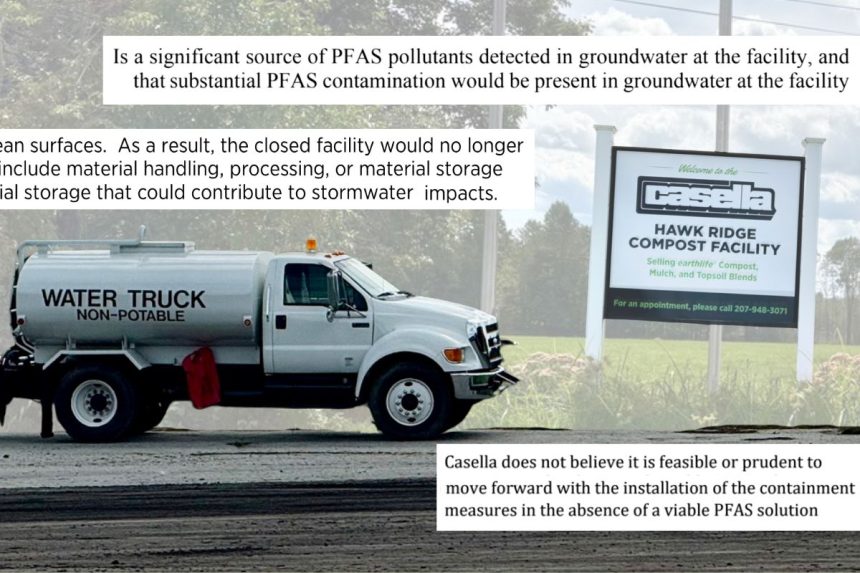This story appears as part of a collaboration between The Maine Monitor and Maine Focus, the investigative team of the Bangor Daily News, a partnership to strengthen investigative journalism in Maine. You can show your support for this effort with a donation to The Monitor. Read more about the partnership.
Tests that confirmed Maine’s largest composting plant had contaminated wetlands more than 2 miles away with “forever chemicals” shined a light on the broad extent of its pollution and likely hastened its closure.
Casella Waste Management, the company that owns Hawk Ridge Compost Facility in Unity Township, cited changing regulations and a lack of facilities that could treat tainted soil and water as reasons for the closure, which was first reported by the Bangor Daily News last month.
But in the months leading up to the closure, emails obtained by BDN show that the company also told Maine regulators that the cost to safely clean up the site and monitor nearby homes and wetlands was high, leading it to reconsider its options and eventually wind down operations there.
The emails show the company and Maine officials struggling to cope with the effects of per- and polyfluoroalkyl substances, known as PFAS, that are known as “forever chemicals” because they are difficult to break down and dispose of safely. The chemicals are often present in sludge, a byproduct of wastewater treatment that was spread widely over U.S. farmland in the 1980s and 1990s as a cheap fertilizer.
Now, Casella and the Maine Department of Environmental Protection are negotiating a closure plan for the facility, with little precedent in Maine or elsewhere to follow.
State policies have not broadly covered how to contain environmental damage from businesses such as the compost operation at Hawk Ridge. Only in the past six years have regulators required routine testing for PFAS chemicals, which are linked to cancer and other health concerns.
The roots of the shutdown date back to April 2022, when Maine Gov. Janet Mills signed a first-in-the-nation law to ban the spreading of sludge-based products to amend soil because of PFAS contamination. The law meant less business in Maine for Casella Organics, which has recently been selling 64 percent of the compost made at Hawk Ridge to Massachusetts customers, according to a January report by Massachusetts regulators.
After the law went into full effect later in 2022, Casella Organics still made compost out of sludge at Hawk Ridge, selling the product outside of Maine. But Maine regulators continued to set standards for maximum levels of contamination in water and soil and to require more testing. That led to revelations about the extent of the contamination at the Hawk Ridge facility in a 2023 investigation commissioned by Casella and submitted to the DEP.
Even though the Hawk Ridge facility has been licensed since 1989 and has produced more than 2 million cubic yards of finished compost, routine testing at the facility and the sludge-based product it makes did not begin until 2019. Casella’s compost is sold mostly in bulk now to commercial buyers. A cubic yard equals about 14 bags of compost sold at a gardening shop.
Before the law prohibited sludge spreading, the state had mandated a safe level of 2,500 parts per trillion for a PFAS chemical known as PFOA, and 5,200 parts per trillion for another known as PFOS. The recent test levels at Hawk Ridge were vastly higher than those past standards.
One pond containing water from sludge processing measured 15,200 parts per trillion to 49,900 parts per trillion over the past two years for the six most commonly measured forever chemicals, the DEP documents showed. Tests of the finished compost were 54,448 parts per trillion for the six chemicals.
The 2023 investigation, conducted by environmental testing firm St. Germain, found that Casella Organics is the primary source of the PFAS detected in on-site soils, catch basins and detention ponds. The facility also is a significant source of pollutants in the groundwater, the study concluded. The study noted that groundwater contaminated with PFAS also is migrating away from the Hawk Ridge property.
In a Feb. 16, 2024 letter, DEP environmental specialist James Pollock asked Casella’s environmental manager, Jeff McBurnie, to submit a written summary by April of sludge-derived products that were applied to land at and around the facility, a plan for monitoring PFAS impacts to nearby wetlands and a plan to collect soil samples. Pollock also said Casella must submit a plan that would discharge fewer pollutants into the surrounding area, which includes wetlands and homes.
On April 1, St. Germain sent the plan on behalf of Casella to take more samples. Another plan followed a few months later to reroute stormwater contaminated from hitting the roof of the composting building into a grassy area instead of continuing to contaminate a nearby pond.
The company proposed three options to dispose of the contaminated pond water. One would get a third party to use a vacuum truck to remove the water and take it to a wastewater treatment facility. The second option would install an above-ground treatment structure to remove the PFAS from the pond water. The third would use a technology called colloidal liquid activated carbon to treat the water in the pond.
Casella said it still had to evaluate the feasibility, cost, effectiveness and long-term maintenance and monitoring of the three options. It also asked the DEP to recommend solutions that have worked elsewhere.
The company said soon thereafter that the options it had suggested could not be implemented because Maine has no treatment facilities or disposal locations. By the end of December 2024, the company told Pollock it “does not believe it is feasible or prudent to move forward with the installation of containment measures” without a viable solution to get PFAS out of the contaminated water.
Casella has been piloting a technique that uses foam to concentrate and collect PFAS at its Coventry Landfill in Vermont. But in February 2024 that system malfunctioned and leaked almost 3,000 gallons of landfill leachate, a wastewater product created when rainwater runs through a lined landfill, according to Vermont Public.
Initial results from the foam treatment showed it removed about 99 percent of four types of PFAS and 66 percent of another type, Casella spokesperson Jeff Weld said. Anson-Madison Sanitary District also had been testing the technology, but it put its project on hold in May to seek more funding.
Meanwhile, further testing at and around the Hawk Ridge facility by St. Germain and the DEP in December 2024 found the contamination had spread further than was thought to wetlands more than two miles downstream. In a June 13, 2025 memo, DEP project hydrogeologist Michael O’Connor recommended that Casella submit a plan for PFAS contamination in that area.
At the end of June, Casella told the DEP that its best plan to correct the damage at Hawk Ridge was to stop operations. While the foam method is the most promising potential treatment, it requires significant capital and long-term operation and maintenance costs, and there is nowhere in Maine to dispose of the residue from the process, Samuel Nicolai, the company’s vice president of engineering and compliance, wrote in an email.
Nicolai also expressed concern about the uncertainty of future state and federal regulations. Massachusetts and other states are currently exploring laws similar to Maine’s that would prevent spreading of sludge-derived compost on land.
“Although the facility has played a critical role for decades in the recycling of biosolids into usable products, the current regulatory environment no longer supports these efforts and Casella has deemed that the continued operation of the Hawk Ridge facility is not sustainable,” Nicolai wrote.
A pile of compost near the back gate of Hawk Ridge Compost Facility as seen on Sept. 20, 2025. The facility began its shutdown on Sept. 1, when it still had 52,740 cubic yards of compost at the facility. A cubic yard is about the size of a small refrigerator. Photo by Lori Valigra of the Bangor Daily News.
Casella permanently stopped receiving sludge deliveries on Sept. 1. It will process the materials it has and sell them until they are gone. It also had 52,740 cubic yards of compost at Hawk Ridge as of Sept. 1 that it will sell. It expects to finish cleanup and removal during 2026.
The DEP is now reviewing Casella’s closure proposal, which includes removing stormwater ponds and draining the acid system, but not taking down buildings. It still is not clear to what degree Casella will clean up the PFAS contamination at the site.
Casella must submit an application to the DEP to close the facility and a post-closure monitoring plan, including for groundwater and surface water. The plan is expected by the end of this year, DEP spokesperson David Madore said.
The company said it will follow through on requirements of an approved plan regardless of the cost, Casella spokesperson Weld said. Some environmental groups doubt the degree to which Casella will be willing to clean the highly contaminated site.
“This is a Casella problem, not a Maine taxpayer problem,” Laura Orlando, a senior scientist at the waste reduction advocacy group Just Zero. said. “I hope the regulators and the courts see it this way. The public certainly does.”
Support for this Bangor Daily News story was provided by the Unity Foundation, a fund at the Maine Community Foundation and donations by BDN readers.









